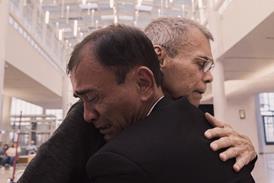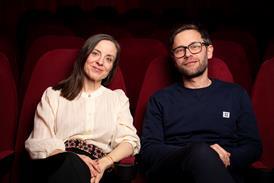While no-one knows the exact number of potentially great film projects that just sit on the shelf, it is estimated 75% of first-time film-makers do not complete their second projects.
When Teresa Cavina, who co-curates the Rome Film Fest's competition selection with Giorgio Gosetti, decided to design a co-production event to coincide with the festival, she thought carefully about constructing one aimed at helping film-makers over this particular hurdle.
She also wanted to create an event that could advance projects set in motion at similar events earlier in the year.
The result is the New Cinema Network, which this year runs October 20-24, during the Rome Film Fest (October 18-27), at the Casa del Cinema, in the park of the Villa Borghese.
Now in its second year, the festival is focusing on industry-oriented events central to the festival's mission.
Cavina worked for five years with Locarno's Open Doors co-production forum and is on the selection committee for the Sundance/NHK Film-makers Award. Gosetti is similarly aware of the value of co-production markets in today's festival environment.
'To me, a project such as New Cinema Network is not only useful but a necessary part of a film festival in the modern era,' Gosetti explains.
This year, the New Cinema Network is -presenting 26 projects during the five-day event. Fourteen projects are part of New Cinema Network's Focus Europe (all proposed second projects), while 12 will be presented in the New Cinema Network's international programme.
The latter have previously been presented at other co-production markets, and are not necessarily the director's second film. By coming to Rome, the aim is for those directors to gain access to new financiers and producers.
'The most important film for a director is his second,' suggests Cavina. 'First, for economic reasons, because there is more access to funds for first features. The other reason is psychological.'
It is what Cedomir Kolar, producer of the Oscar-winning No Man's Land, calls 'the second-film syndrome'. Kolar sits on the Focus Europe selection committee and jury.
With this in mind, New Cinema Network Focus Europe provides a wake-up call to directors. 'It is the right time to go for the second film, when the first film has been distributed within the last year and a half,' Cavina says.
'When a film-maker is done with a first feature he does not always find energy or strength, or he sticks too much to the first film and travels with it to festivals, and [in that way] postpones the second one.'
Focus Europe
To be selected for inclusion in Focus Europe, directors must submit their first film and a treatment for their proposed second film.
Around 40 international producers will be invited to participate in New Cinema Network, along with potential partners from Business Street and the Rome Film Fest's Market Event.
Last year, $27,700 (Eu20,000) in development funding was awarded to Spanish director Santiago Tabernero for his second project, Capitano! (it was chosen by the three producers on the selection committee, Kolar, Rosanna Seregni and Simon de Santiago).
The film is now ready to shoot. Cavina and Gosetti would like to award a similar prize this year. Italian projects are also eligible for the Siae Award from the Italian author and editors organisation.
The directors' first films will be showcased at public screenings at the Cinema Farnese in Rome's Campo dei Fiori. A jury of 10 students from Rome's universities and film school will select the best film.
Potential co-production partners will be able to view all the films, from both the European and international directors, at the video library at the Casa del Cinema.
The world in a year
The international projects being showcased by New Cinema Network have a different mission: to link the Rome event with similar initiatives throughout the year.
They include the Sundance's year-round directing and screenwriting labs, Rotterdam's CineMart in January, the Berlinale Co-Production Market in February, the Hong Kong Asia Film Financing Forum (HAF) in March, and the Cinefondation's Atelier du Festival at the Cannes film festival in May. HAF and Cinefondation's Atelier formally co-operate with Rome's New Cinema Network by sending three top projects from their own events, enabling the film-makers to obtain fresh exposure at Rome.
Ivy Ho, deputy director of HAF says, 'In terms of timing, it works well for the film-makers because Hong Kong film-makers meet certain financiers in March and they might secure financing but not 100%.
When they get to Rome, their project is more advanced and they can meet new financiers that were not at HAF in March.'
Among the international projects presented at the first New Cinema Network in Rome last year and now making headway are The Legend Of D'Arhaz by Morocco's Nabil Ayouch which is ready to shoot, State Of Violence by South African director Khalo Matabane, and The Great Kilapy which is set to shoot in Mozambique in October, to be directed by Portugal's Zeze Gamboa.
Rome in turn works with HAF by presenting a $13,600 (Eu10,000) cash prize to the most innovative Asian film presented at the Hong Kong event.
This year's recipient was The Good, The Bad And The Weird directed by Korea's Kim Jee-woon. Cavina describes the film as 'an interesting model of translation' for its application of the Sergio Leone western theme to 1930s Mongolia, a period when Koreans were fleeing from Japanese invaders.
Ho says co-production events are invaluable to film-makers. She points to previous HAF projects such as Li Yu's Lost In Beijing, which screened at Berlin this year, and Lee Kang-sheng's Help Me Eros, which made its world premiere out of competition at Venice last month.
For African projects, Cavina liaises with South Africa's Durban Film Festival, while Latin American selections come through the Buenos Aires Lab (BAL), the co-production event that takes place during the Buenos Aires Film Festival, and from various cultural institutions throughout the continent.
Being part of the international chain of co-production events is of paramount importance to Gosetti and Cavina. 'This will be a success if we provide good projects to the international production community and if we are able to encourage good directors to continue their work,' says Gosetti.
When Teresa Cavina, who co-curates the Rome Film Fest's competition selection with Giorgio Gosetti, decided to design a co-production event to coincide with the festival, she thought carefully about constructing one aimed at helping film-makers over this particular hurdle.
She also wanted to create an event that could advance projects set in motion at similar events earlier in the year.
The result is the New Cinema Network, which this year runs October 20-24, during the Rome Film Fest (October 18-27), at the Casa del Cinema, in the park of the Villa Borghese.
Now in its second year, the festival is focusing on industry-oriented events central to the festival's mission.
Cavina worked for five years with Locarno's Open Doors co-production forum and is on the selection committee for the Sundance/NHK Film-makers Award. Gosetti is similarly aware of the value of co-production markets in today's festival environment.
'To me, a project such as New Cinema Network is not only useful but a necessary part of a film festival in the modern era,' Gosetti explains.
This year, the New Cinema Network is -presenting 26 projects during the five-day event. Fourteen projects are part of New Cinema Network's Focus Europe (all proposed second projects), while 12 will be presented in the New Cinema Network's international programme.
The latter have previously been presented at other co-production markets, and are not necessarily the director's second film. By coming to Rome, the aim is for those directors to gain access to new financiers and producers.
'The most important film for a director is his second,' suggests Cavina. 'First, for economic reasons, because there is more access to funds for first features. The other reason is psychological.'
It is what Cedomir Kolar, producer of the Oscar-winning No Man's Land, calls 'the second-film syndrome'. Kolar sits on the Focus Europe selection committee and jury.
With this in mind, New Cinema Network Focus Europe provides a wake-up call to directors. 'It is the right time to go for the second film, when the first film has been distributed within the last year and a half,' Cavina says.
'When a film-maker is done with a first feature he does not always find energy or strength, or he sticks too much to the first film and travels with it to festivals, and [in that way] postpones the second one.'
Focus Europe
To be selected for inclusion in Focus Europe, directors must submit their first film and a treatment for their proposed second film.
Around 40 international producers will be invited to participate in New Cinema Network, along with potential partners from Business Street and the Rome Film Fest's Market Event.
Last year, $27,700 (Eu20,000) in development funding was awarded to Spanish director Santiago Tabernero for his second project, Capitano! (it was chosen by the three producers on the selection committee, Kolar, Rosanna Seregni and Simon de Santiago).
The film is now ready to shoot. Cavina and Gosetti would like to award a similar prize this year. Italian projects are also eligible for the Siae Award from the Italian author and editors organisation.
The directors' first films will be showcased at public screenings at the Cinema Farnese in Rome's Campo dei Fiori. A jury of 10 students from Rome's universities and film school will select the best film.
Potential co-production partners will be able to view all the films, from both the European and international directors, at the video library at the Casa del Cinema.
The world in a year
The international projects being showcased by New Cinema Network have a different mission: to link the Rome event with similar initiatives throughout the year.
They include the Sundance's year-round directing and screenwriting labs, Rotterdam's CineMart in January, the Berlinale Co-Production Market in February, the Hong Kong Asia Film Financing Forum (HAF) in March, and the Cinefondation's Atelier du Festival at the Cannes film festival in May. HAF and Cinefondation's Atelier formally co-operate with Rome's New Cinema Network by sending three top projects from their own events, enabling the film-makers to obtain fresh exposure at Rome.
Ivy Ho, deputy director of HAF says, 'In terms of timing, it works well for the film-makers because Hong Kong film-makers meet certain financiers in March and they might secure financing but not 100%.
When they get to Rome, their project is more advanced and they can meet new financiers that were not at HAF in March.'
Among the international projects presented at the first New Cinema Network in Rome last year and now making headway are The Legend Of D'Arhaz by Morocco's Nabil Ayouch which is ready to shoot, State Of Violence by South African director Khalo Matabane, and The Great Kilapy which is set to shoot in Mozambique in October, to be directed by Portugal's Zeze Gamboa.
Rome in turn works with HAF by presenting a $13,600 (Eu10,000) cash prize to the most innovative Asian film presented at the Hong Kong event.
This year's recipient was The Good, The Bad And The Weird directed by Korea's Kim Jee-woon. Cavina describes the film as 'an interesting model of translation' for its application of the Sergio Leone western theme to 1930s Mongolia, a period when Koreans were fleeing from Japanese invaders.
Ho says co-production events are invaluable to film-makers. She points to previous HAF projects such as Li Yu's Lost In Beijing, which screened at Berlin this year, and Lee Kang-sheng's Help Me Eros, which made its world premiere out of competition at Venice last month.
For African projects, Cavina liaises with South Africa's Durban Film Festival, while Latin American selections come through the Buenos Aires Lab (BAL), the co-production event that takes place during the Buenos Aires Film Festival, and from various cultural institutions throughout the continent.
Being part of the international chain of co-production events is of paramount importance to Gosetti and Cavina. 'This will be a success if we provide good projects to the international production community and if we are able to encourage good directors to continue their work,' says Gosetti.


















No comments yet